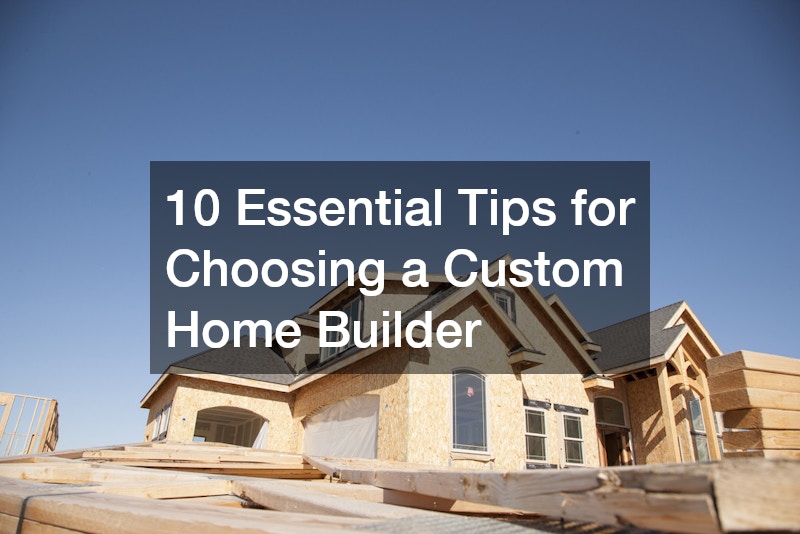
Building a custom home is a significant investment, and selecting the right custom home builder is crucial to ensure your dream home becomes a reality. The process involves more than just hiring a contractor; it’s about finding a partner who understands your vision, respects your budget, and has the expertise to deliver a high-quality result. This guide provides essential tips to help you navigate the process of choosing a custom home builder, equipping you with the knowledge to avoid common pitfalls. By considering a builder’s reputation, qualifications, and communication style, you can make an informed decision that aligns with your vision and budget. With the right builder by your side, you’ll be on the path to creating a home that perfectly reflects your needs, style, and aspirations.
1. Why Is Choosing a Custom Home Builder So Important?

Choosing a custom home builder is one of the most critical decisions in the custom home build process. A competent builder will ensure that the design and construction meet current standards and that your personal preferences are adequately addressed. This decision impacts your future living environment, which influences your lifestyle and possibly your real estate investment returns.
An experienced home builder understands local regulations and building codes that affect construction. They coordinate with other professionals like home mortgage brokers, real estate agents, and potentially even a home owners insurance agent to make sure all aspects are covered. Thorough vetting of your custom home builder reduces the risk of project delays and budget overruns.
The builder’s role extends beyond merely constructing the house; they also manage project timelines, supply chain logistics, and labor coordination. They establish reliable partnerships with contractors for specialized tasks, such as residential roofing or ac repair. Choosing a custom home builder is crucial because you are not just investing in a structure, but in someone who will manage these complex tasks on your behalf.
2. What Qualifications Should a Custom Home Builder Have?
When choosing a custom home builder, verifying their qualifications is imperative to ensure they can effectively execute your vision. Builders should hold the necessary certifications and licenses required by local building authorities. These credentials assure you that they have met the minimum industry standards and are up-to-date with current construction practices.
Aside from formal qualifications, practical experience on similar projects is invaluable. Custom home building often involves unique challenges, and a seasoned home-building company will have the expertise to navigate unexpected issues. Familiarity with local modular home structures can also be beneficial for specific environments and design preferences.
Lastly, a qualified builder often partners with specialists, from architectural designers to subcontractors specializing in areas like residential roofing or air conditioner repair. Their connections can provide added assurance that the project will be completed with quality craftsmanship and within the set timeline. Always inquire about the builder’s past projects, client references, and industry affiliations when assessing their qualifications.
3. How Can I Verify the Reputation of a Custom Home Builder?
To verify the reputation of a custom home builder, start by seeking recommendations from friends, family, and colleagues who have completed similar custom home build projects. Online reviews and ratings on platforms like Yelp, Google, and specialized construction forums provide insights into previous customer experiences. Testimonials can give you a sense of how the builder handled various project aspects and how satisfied clients were with the completed homes.
Engaging with local real estate agents can also offer information about reputable builders within a specific region. Agents typically work with several builders and can provide insights based on property values, neighborhood dynamics, and client feedback. Additionally, contacting a home building company‘s previous clients directly can offer candid feedback about the builder’s reliability and quality of work.
Furthermore, a trustworthy builder will have no issue providing evidence of their reputation, including project portfolios, client testimonials, and professional affiliations. A home mortgage broker can sometimes recommend builders, as they often have ongoing relationships with builders who deal in custom home projects. Confirming that the builder maintains positive working relationships with industry professionals is a good indicator of their reliability.
4. What Questions Should I Ask During the Initial Consultation?

The initial consultation with a custom home builder is an excellent opportunity to gauge their capability and fit for your project. Start by asking about their experience with projects similar to yours; inquire about the type of homes they have previously built and the complexity of those builds. This question helps assess whether they are familiar with the specific needs of your vision.
Understanding their project management approach is equally important. Ask about their methods for tracking progress, managing timelines, and communication channels. Knowing how they handle potential delays or unexpected issues will reveal their problem-solving skills and capacity for transparent communication.
Finally, discuss their understanding of budget constraints and pricing models. Request a breakdown of potential costs and ask how they plan to manage budget adherence throughout the project. Clarity in financial matters during the consultation helps reduce surprises and builds trust in the builder’s financial acumen.
5. How Can I Ensure the Builder Understands My Vision?
Communicating your vision accurately is critical when working on a custom home build. Begin the process by providing the builder with comprehensive design plans, sketches, and any inspiration you have gathered. This initial exchange allows the builder to understand your aesthetic and functional preferences.
Engage in detailed discussions with the builder about each aspect of the home, from architectural features to specific materials you wish to use. Ask them to express their understanding of your vision back to you, which can highlight any misinterpretations early on. It’s beneficial to involve experts like architects or designers who can ensure that both you and the builder are aligned.
Consider utilizing visualization tools and software that some home building companies offer, which can create virtual walkthroughs of your proposed design. This not only aids in helping the builder capture your vision but also allows you to make adjustments before construction begins. Regular site visits and progress evaluations ensure the project continues to reflect your original vision.
6. What Should Be Included in the Contract?
A detailed contract is essential when choosing a custom home builder, serving as a safeguard for both parties. Key elements of the contract should include the scope of work, a clear timeline for each phase of the construction, and payment schedules. Each task should be broken down to minimize misunderstandings about responsibilities and deliverables.
Ensure that the contract outlines material specifications and standards, as well as which parties are responsible for providing necessary permits and inspections. These details protect you against changes in materials or lower quality alternatives unless otherwise agreed upon. Including penalties or resolutions for unapproved changes or delays offers added security.
Finally, clarify procedures for handling any disputes or changes in scope. Consistent with industry best practices, this might involve a formal process for managing amendments to the original agreement. Consulting with a real estate agent or attorney before finalizing the contract can help identify any potential issues or gaps in the documentation.
7. How Do I Manage Budgets and Timelines With a Custom Home Builder?

Effectively managing budgets and timelines requires close collaboration with your custom home builder. Begin by setting a realistic budget that accounts for construction costs, potential overruns, and contingencies. A transparent breakdown of projected expenses provides a roadmap for tracking costs throughout the custom home build process.
Establish clear benchmarks and deadlines for different stages of the project. Regularly scheduled meetings with your builder ensure that progress aligns with the timeline and budget. Using project management tools or software can provide real-time updates and help maintain accountability on both sides.
Communication is vital; consistent dialogue with your builder helps manage expectations and address potential issues before they escalate. Establishing an open line of communication with ancillary professionals, such as residential roofing contractors or ac repair specialists, contributes additional oversight and keeps the project on schedule. Accurate forecasting, effective cost management, and ongoing communication are key to keeping timelines and budgets intact.
8. What Are the Warning Signs of an Unreliable Custom Home Builder?
Identifying a potentially unreliable custom home builder early can save both time and money. A major red flag is a lack of transparency in their communication or hesitation to provide detailed estimates and project timelines. If a builder avoids outlining specific costs or fails to offer clear documentation, it may indicate financial instability or inexperience.
Frequent delays in the initial stages of the project, difficulty in reaching the builder, or vague answers to your questions can also signal unreliability. These issues can lead to bigger problems later in the custom home build and result in dissatisfaction with the final product. Be wary of builders who have a high turnover of subcontractors or ongoing disputes, which might compromise the quality of their work.
No builder should have difficulty providing references or examples of past work. If obtaining this information proves challenging, it could suggest a lack of satisfied customers or recent projects. Inconsistencies in their explanations or evasiveness during an initial consultation also hint at possible unreliability. Trust your instincts and thoroughly investigate any concerns before committing.
9. How Can I Assess the Quality of a Builder’s Previous Work?
Evaluating a custom home builder’s past work is crucial to understanding their capability and quality standards. Request to tour completed projects or ongoing builds to get a direct sense of their craftsmanship and attention to detail. Pay close attention to aspects like finishing, architectural alignment, and the integration of systems like HVAC and plumbing.
Engaging with previous clients to learn about their experiences can shed light on how the builder handled their custom home build process. Were timelines adhered to, and did the final build meet their expectations? Direct testimonials from past clients can also reveal how effectively the builder communicates and resolves issues.
Check for certifications or accolades from industry organizations, which can further verify the quality of their work. Reviews on professional building associations or construction-specific forums can additionally itemize both the strengths and potential areas of improvement for the builder. Evaluating these multiple angles offers a holistic view of a builder’s capabilities.
10. What Role Does Communication Play in the Custom Home Building Process?

Communication is the foundation upon which successful custom home builds are constructed. From the initial consultation to the handover of keys, consistent and clear communication ensures both you and your builder are aligned in terms of goals and expectations. Misunderstandings can lead to costly delays and the need for rework, which can derail even the most well-planned projects.
Establishing regular check-in meetings as well as identifying main points of contact within the home building company helps keep the information flow steady. Documenting discussions, decisions, and any changes to your agreement provides a reliable record to refer back to if disputes arise. Transparent communication methods contribute to a more efficient and less stressful building process.
Communication extends to coordination with ancillary professionals, such as ac repair specialists or residential roofing contractors, to ensure all components of the home are integrated smoothly. The builder should offer a communication plan outlining how updates will be provided and how any issues will be addressed. Strong communication skills are a hallmark of a professional and reputable builder.
Choosing the right custom home builder is key to a successful home-building experience. By considering qualifications, verifying reputation, and ensuring clear communication, you can embark on your home-building journey with confidence. A focused approach will help ensure that your dream home is built to suit your specific needs and preferences. Additionally, taking the time to visit previous projects, speak with past clients, and review contracts in detail can provide invaluable insight into the builder’s capabilities and work ethic. Remember, the right builder will not only bring your vision to life but also make the process enjoyable and stress-free. With careful planning and due diligence, you can create a home that reflects your style, enhances your lifestyle, and becomes a lasting source of pride and comfort for years to come.



